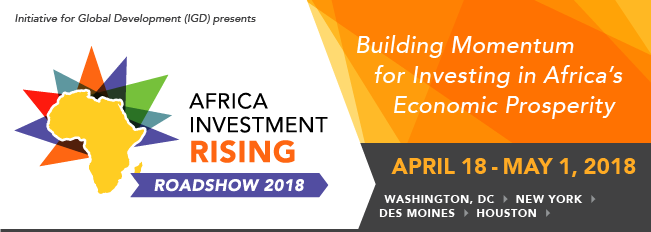The New York City stop on the April 18-May 1 “Africa Investment Rising: Building Momentum for Investing in Africa’s Economic Prosperity” roadshow organized by the Institute for Global Development (IGD) brought together government and private sector representatives to share ideas and network around the continent’s business and investment opportunities.
IGD’s goals were clear: Reshape perceptions of doing business in Africa to bolster U.S. investment, and forge stronger connections between U.S. and African business leaders in key growth sectors. There clearly was a desire, or an attempt, to include small and medium-sized enterprises.
Having spent more than four decades providing advocacy, education and training, and business opportunities to SMEs—primarily those owned by Africans in the diaspora who aspire to be successful global entrepreneurs—I am deeply concerned about the “reshaping of the perceptions” that have relegated Africans on the continent and in the diaspora to the liability side of the development equation.
Be it access to financing, productive capacity, technology innovation, or any other ingredients required for economic development and industrialization, there is the perception that Africans do not control any of them. Beyond the perceptions that often influence business decisions, however, there is the reality of who owns the critical human and natural resources, and how these ultimately will be managed. For those of us who are attentive to today’s technology-driven shared economy, “control” versus “ownership” of assets could be a major determinant of the rate at which African SMEs drive economic growth on the continent.
It is encouraging that the IGD campaign is led by Mima Nedelcovych, Ph.D., an experienced, committed Africa expert, who has taken on the task of clarifying to investors and SMEs the perceptions and vision of countries crudely disparaged by U.S. President Donald Trump. Those very countries have just created one of the largest free-trade bodies under their Continental Free Trade Agreement (CFTA). The UN Economic Commission for Africa (UNECA) estimates the Agreement will increase intra-African trade by 52 percent by 2022 from 2010. Considered the largest trade agreement since the World Trade Organization was created, the CFTA will bring together some 1.2 billion people with a combined GDP of more than $2 trillion.
Can the U.S. investment and trade community grasp the magnitude of business opportunities involved in this emerging continental economy? Will it cede these benefits to their Chinese counterpart? If Americans still see Africans as a needy, aid-dependent, corrupt society, they will miss the continent’s prosperity boat that is expected to deliver 11 million jobs annually in the formal economy, creating considerable wealth in the process.
While USAID was front and center in the IGD’s Rising Africa Campaign roadshow, one cannot ignore the attitude of the Trump administration towards Africa—an attitude grounded in the notion that Africa does not offer much beyond the security interests of the US; bolstered by the fact that U.S.-Africa trade has been shrinking for the last several years. The U.S. trade deficit with the 38 beneficiaries of the Africa Growth and Opportunity Act (AGOA)–which grants preferential access to U.S. markets for specific goods—dropped to about $8 billion in 2017 from $64 billion in 2008, largely attributable to shrinking oil imports from those countries.
Africans, meanwhile, are formulating and offering new perceptions and visions on development. Ken Ofori-Atta, Ghana’s finance minister, encouraged the IGD audience in New York to “be deliberate, think it through, and not be afraid of enlightened self interest” as they navigate “Ghana Beyond Aid,” Ghanaian President Nana Akufo-Addo’s initiative to drive wealth, inclusion, sustainability and empowerment (WISE) in his country’s development.
President Akufo-Addo recently told an Oxford University audience that it is time to relieve the aid donors of their burden as Africans assume responsibility for their own destiny and take charge of their own affairs. At the same time, he condemned the continuation of a colonial imposed, prosperity-retarding “economic structure” exacerbated by mismanagement, corruption, and high fiscal deficits. At the New York stop on the IGD’s roadshow, Ofori-Atta, a successful entrepreneur prior to joining government and a role model for African entrepreneurs, was the only presenter to address corruption, one of the most critical issues affecting SMEs.
I once heard an African executive explain to a group of senior U.S. executives that in his native language there is no word for “corruption,” a practice, he noted, introduced by major western corporations. Whereas such corporations can afford to write off the cost of corruption as a means of doing business, small companies are at a disadvantage in this pay-to-play game. Coupled with the requirement to comply with various regulations—including Section 1502 of the U.S. Dodd Frank that clamps down on trade in “conflict minerals” originating in the Democratic Republic of Congo, and OECD requirements affecting commodities such as strategic metals and minerals, including gold—SMEs face serious challenges in cost and administration.
The political leadership of Ghana and East Africa were instrumental in destroying the corruption of colonialism. History may repeat itself if the anti-economic corruption actions of the current administrations in Kenya and Tanzania bear fruit. “In the end, it must be dealt with firmly,” says Kenyan President Uhuru Kenyatta, likening graft to colonialism and describing those accused of corruption as “predators.”
And if Ghana again becomes a beacon for change in Africa and successfully controls corruption, it would render the IGD’s efforts all the more relevant for the U.S. and Africa’s SME communities as a platform to “forge stronger connections between U.S. and African business leaders.”
As a relentless advocate of relationship capital in the development process, I hope that the new thinking by Africa’s political and business leadership will create the environment for the U.S. SMEs to make their contribution to that 20th Century vision of “One God, One Aim. One Destiny, One Africa.”
After four U.S. stops—in Washington, D.C.; New York; Des Moines, Iowa; and Houston, Texas—the IGD roadshow culminates in November in Johannesburg, South Africa. This is where one should expect returns from the roadshow on “perceptions and realities of doing business on the continent.” In the final analysis, the true entrepreneur wants to know two things: “Who owns and controls the keys to this $2 trillion market?” and “Can I expect a ‘clean’ deal?”
Fritz-Earle Mc Lymont is a New York City based entrepreneur engaged in the energy and precious metals industries. He writes and lectures on international trade and entrepreneurship and may be contacted at mclymont@globaldrinc.com.













